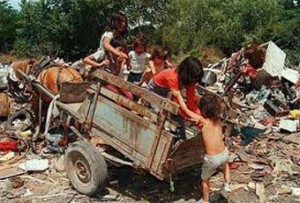Post Traumatic Ghetto Stress
Posted by Philippe Matthews on Feb 28, 2014 in Poverty | Comments Off on Post Traumatic Ghetto Stress

 Ghetto is defined in the Merriam Webster dictionary as “a part of a city in which members of a particular group or race live usually in poor conditions.” On Dictionary.com, the term “ghetto” is defined as “a section of a city, especially a thickly populated slum area, inhabited predominantly by members of an ethnic or other minority group, often as a result of social or economic restrictions, pressures, or hardships.” As you might have noticed, the key feature that stands out from both definitions is the prevalence of an impoverished environment.
Ghetto is defined in the Merriam Webster dictionary as “a part of a city in which members of a particular group or race live usually in poor conditions.” On Dictionary.com, the term “ghetto” is defined as “a section of a city, especially a thickly populated slum area, inhabited predominantly by members of an ethnic or other minority group, often as a result of social or economic restrictions, pressures, or hardships.” As you might have noticed, the key feature that stands out from both definitions is the prevalence of an impoverished environment.
People who live in an impoverished environment are exposed to all kinds of dangers from the moment they are born until they grow up. Crime is a normal occurrence they hear about. Theft is most likely something they witness almost all of their lives. Now, these kinds of scenarios that occur almost every day can have adverse effects on the brain. In other words, it leads to people developing post-traumatic stress disorder (PTSD).
Yes, although PTSD is most likely associated with war veterans, having been to war is not the only trigger needed to develop PTSD. While it is a fact that traumas such as accidents, rape, or a violent crime are major contributors to people developing PTSD, those who have suffered chronic traumas such as being subjected to child abuse, living in an area with a high crime rate, or living in an area with extreme poverty are also prone to PTSD.
In short, people living in adverse environments have a high chance of developing PTSD. Each and every day, their lives are filled with uncertainty. What happens when they walk out of their door? What will happen once they get home? Will they meet some sort of unfortunate event on their way to school or work? Questions about safety and security usually linger in the minds of those living in poverty.
Apart from that, there’s also the question of financial and job stability. People living in a disadvantaged situation are always going to wonder whether they will have enough money to get by the next day, whether they will have sufficient money to pay for bills, and other finance-related matters.
On the employment front, they are faced with not being able to secure high-paying jobs. That is not even the worst part. The worst part is that their employment status will always remain a question. Who knows how long they can hold on to their current job? What if the store they are employed in is shut down for some reason? This will leave them jobless, and all the more important, add more stress to their current difficult situation.
One of the worst things about living in absolute poverty is that some people actually turn to violence as a result of all their experiences and frustrations. Not only that, there’s also a huge chance that they will turn to drugs as an escape. This is absolutely the thing you don’t want for any of your family members. This is why it is very important to understand the first signs of PTSD in your friends and family. This way, you’ll be able to get all the help they need so their lives can make a turn for the better, and not the worst.
The question is: what if they are already diagnosed with PTSD? The answer is that help is still very much possible. Recovery from something as serious as PTSD can be achieved as long as proper help is given. Although their brains are already wired to the negative, this can be re-wired to think about more positive things.





